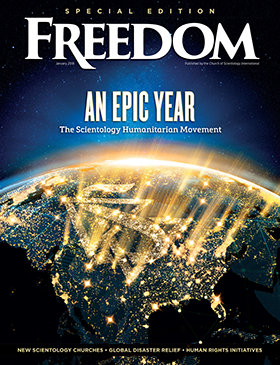A new round of investment to modernize America’s nuclear arsenal threatens to lock in a new global arms race—at a taxpayer cost of $1 trillion.

When Megan Rice broke into the National Security Complex in Oak Ridge, Tennessee, with two other peace activists in 2012, the then 82-year-old Catholic nun said she felt a moral obligation to draw public attention to what she has called the “crime” of nuclear weapons production.
Caught and convicted of sabotage and damaging federal property, she served two years of a 35-month prison sentence before an appeals court vacated her conviction on reduced charges and set her free in May.
But the now 85-year-old nun says she still doesn’t feel “free.”
“As long as there’s one remaining thermonuclear weapon, none of us can be considered free,” Rice said in an interview with Freedom Magazine.
“Humanity,” she said, is the real victim here.
Rice and two accomplices entered the facility under the aegis of Transform Now Ploughshares, a national antinuclear weapons group. They spent two hours praying, painting messages in blood, hanging banners and banging on a uranium storage bunker, causing $70,000 in damage—the government alleged—before being apprehended.

Rice didn’t break any laws, she says, because the facility itself was illegal. She justifies the intrusion onto the nuclear weapons site by her understanding of moral codes outlined by Ralph Waldo Emerson and Martin Luther King Jr. “All citizens are required to expose and oppose known crimes, equally responsible, according to their ability, and according to their situation,” she told Al Jazeera in an interview published in June.
“The U.S. is not living up to its obligations of those signed legal treaties and agreements; therefore it’s criminal activity going on there as long as they are proliferating rather than dismantling nuclear weapons,” Rice told Freedom, citing the United Nations’ Treaty on the Non-Proliferation of Nuclear Weapons (NPT)—among others—that the U.S. has been party to since 1970.
The activist nun’s sentiments about the continuation of the nuclear arms race, which has received fresh blood with recent efforts by Iran to acquire atomic weapons, echo the frustrations of many international activists. In 1968, the five declared nuclear weapons states pledged in the Non-Proliferation Treaty to “pursue negotiations in good faith on effective measures relating to cessation of the nuclear arms race at an early date and to nuclear disarmament.”

The treaty went into effect in 1970, but after nearly half a century, none of the nuclear weapons states appear ready to follow through.
The 2015 NPT Review Conference, held every five years, ended in May with a failure to reach a substantive outcome. This prompted U.N. Secretary-General Ban Ki-moon to issue a statement lamenting how the nuclear states were “unable to narrow their differences on the future of nuclear disarmament.”
The secretary-general warned in remarks delivered to delegates by a deputy at the beginning of the conference of the dangers of expensive nuclear modernization programs “that will entrench nuclear weapons for decades to come. Instead of pursuing proposals to accelerate nuclear disarmament … there has been a dangerous return to Cold War mentalities,” he noted.
These developments contrast starkly with conventional wisdom that the Cold War ended when the Soviet Union collapsed. Stockpiles have indeed been reduced over the decades, but the U.S. and Russia still maintain arsenals with roughly 1,800 nuclear weapons capable of being deployed at any time. Activists at the nonprofit Global Zero warned the world during the NPT conference that “we’re all sitting ducks,” with a projection of crosshairs on the U.N. headquarters in New York.

Hans M. Kristensen, director of the Nuclear Information Project at the Federation of American Scientists, drew attention to this quandary in an article in the summer of 2014, warning that modernization programs are a direct threat to the NPT. Kristensen’s primary job is keeping tabs on the world’s nuclear arsenals, estimated at more than 15,000 missiles last year, 90 percent of which belong to the U.S. and Russia.
Kristensen concluded in his article for the Arms Control Association that “Without some form of limitations on the pace and scope of nuclear modernization, the goals of deep cuts in and eventual elimination of nuclear weapons remain elusive….”
He noted that it appears that reducing the existing nuclear threat is “increasingly unlikely” and wrote that modernizing such weapons is a “reaffirmation of the value of nuclear weapons” by nations that “threaten to extend the nuclear era indefinitely.”
“In the last five years here, things have really taken a turn south,” Kristensen said in a phone interview with Freedom, concurring with Ban Ki-moon on how the tide for disarmament has ebbed since President Obama’s much-lauded 2009 speech in Prague, where the president was quoted in news reports as boasting of “America’s commitment to seek the peace and security of a world without nuclear weapons.”
Kristensen said he gives Obama a “B minus”grade for his disarmament efforts since then, noting that Obama’s pledge as a presidential candidate to seek dramatic reductions on nuclear weapons has not materialized. He added that the current modernization program, which will see the U.S. spend about $348 billion over the next 10 years, is now overshadowing Obama’s efforts on reduction.
“That’s where the new focus really is and that’s going to be a contrast to his arms control legacy,” he said.
Retired U.S. Army Col. Larry Wilkerson, who served as chief of staff for Secretary of State Colin Powell, also faults Obama on disarmament. An outspoken critic of the global politics leading up to and following the Iraq War, including what he called “the bankruptcy of this democracy under George W. Bush,” Wilkerson gives Obama the same grade on disarmament as each of the preceding presidents of the nuclear era.
“I’d give them all an ‘F’ on disarmament,” Wilkerson told Freedom. He lamented how the transnational corporations of Big Energy and Big Pharma have joined the military-industrial complex in heavily influencing government policy.

“Modernization is a buzzword for ‘Hey, we need to make some more money,’” Wilkerson said of the Department of Defense and Department of Energy. “I haven’t seen an argument to justify the money spent,” he added, noting that he’s seen the technical data involved and questions its cost-effectiveness.
“I’ve heard experts I trust say we could spend 50 percent less,” he said.
A president can only do so much without the cooperation of Congress though, and this is where Obama has run into a major roadblock, according to Jeffrey Lewis, founding publisher of the Arms-ControlWonk.com blog. “The president’s rhetoric ran into the reality of politics in the United States,” Lewis said in a recent phone interview with Freedom.
“One of the realities about our political system is that if the president comes out and says he’s for disarmament, then he has to go spend a bunch of money on nuclear weapons to show that he’s not weak on defense,” Lewis said.
He cited the U.S. Senate’s ICBM Coalition, which features eight senators from states with ICBM installations, as a major political obstacle to arms reduction. Representing the rural states that have intercontinental ballistic missile silos dotting their sparse landscapes, the coalition is an obstacle to nuclear arsenal reductions, since the senators treat the issue like any other pork barrel politics.
“I’ll give you a perfect example of their power,” Lewis said, citing the new Strategic Arms Reduction Treaty (START) with Russia that went into effect in 2011. It asserted each side could only have 700 deployed missiles and bombers but allowed for a force structure of 720.
“It was because they didn’t want to admit they were going to get rid of 20 ICBMS,” he said. “They thought that even a modest reduction from 420 to 400 would turn all those senators against the treaty…. If you can’t as part of nuclear reductions with the Russians eliminate a lousy 20 ICBMS, good luck with disarmament, right?”
Hans Kristensen from the Federation of American Scientists concurred, saying the U.S. needs to “stop letting a few senators from a few states dictate maintaining excessive nuclear force levels.”

He said military officials in charge of Air Force planning will admit the U.S. has about 100 ICBMs more than it needs, “simply because of opposition from Congress.” But he also cited Russian leader Vladimir Putin as another obstacle.
“Congress … is one of the sticks in the wheel so to speak, and the other stick of course is Putin. So that’s the kind of dilemma that the Administration is in. It wants to do more reductions, it wants to do more changes in the posture, but it doesn’t have the room to maneuver and get this through Congress and get Russia to support additional measures. So that’s a real dilemma,” Kristensen explained.
He added that Putin is stalling on further reductions because he does not want to be seen going along with the United States at a time when he wants to be viewed at home as standing up to the West.
While disarmament ultimately lies with governments, there are also civilian organizations working to generate the political capital needed to bring about real change. The Nuclear Age Peace Foundation is one of these, with founder David Krieger leading the effort as president since 1982. In a letter to the editor published in the Santa Barbara News-Press in June, Krieger summarized the situation:

“We are playing a very dangerous game of nuclear roulette, with the missiles pointed at humanity’s heart. This game is based upon an illogical, faith-based reliance on nuclear deterrence—the threat of massive, omnicidal nuclear retaliation….”
Krieger has little sympathy for the pork barrel political issues that conflict with disarmament goals.
“We’re talking about a problem that could end civilization or even the human species, so to focus the issue on profit seems like a terrible abdication on the part of the government,” Krieger told Freedom. “It’s disgraceful, actually, and particularly so given the positive way Obama presented himself to the world in Prague … and then behind the scenes, setting up a bureaucracy that is prone to support nuclear weapons and modernization.”
Krieger traces the rising tensions between the U.S. and Russia to President George W. Bush’s 2002 withdrawal and abrogation from the 1972 Anti-Ballistic Missile Treaty and subsequent provocative placement by NATO of missile defenses near the Russian border. But Krieger also feels that President Obama has fallen short in his attempts to improve on Bush’s much-maligned efforts at international relations.
“Obama has talked a good game, he talked himself into a Nobel Peace Prize with his Prague speech, but he hasn’t lived up to deserving it,” Krieger said.

The NAPF is currently serving as a consultant to the lawsuits from the Marshall Islands against the nuclear states in the International Court of Justice and against the U.S. in federal court. The suit notes that the Republic of the Marshall Islands sustained terrible cultural and physical damage during 67 American nuclear weapons tests from 1946 to 1958. The lawsuit calls upon the U.S. to fulfill its legal obligations under the NPT to negotiate in good faith to end the nuclear arms race and work toward total nuclear disarmament. The Nuclear Zero lawsuit against the U.S. was dismissed in Federal District Court in February, but an appeal was filed July 13.
“This case asks the question whether the president of the United States is above the law—and the law here is Article VI of the NPT, a legally binding treaty,” according to comments in a NAPF press release by Laurie Ashton, lead attorney for the Marshall Islands in the U.S. case.
“But while the United States has the world focused on nonproliferation measures across the globe, it is in flagrant breach of its obligation to negotiate complete nuclear disarmament,” the release said. “It refuses to discuss any timetable whatsoever to achieve nuclear disarmament, and is instead actually modernizing its nuclear arsenal with new capabilities to last decades into the future. The lawsuit brings these breaches to court, forcing the U.S. to respond in public.”

Another civilian group working to educate the public and advocate for stronger disarmament measures is Physicians for Social Responsibility (PSR). PSR’s Security Program Director Martin Fleck says the organization works to address two of the gravest threats to human health: climate change and nuclear weapons.
“It’s time for reason to prevail and it’s unreasonable to plan to spend $348 billion over the next 10 years,” Fleck said. He dubbed the number of nuclear missiles on active alert status as “a policy that is a relic from the previous millennium and puts us all unnecessarily at risk.”
One of Fleck’s top projects with PSR is the Humanitarian Impact Initiative, a global campaign to reframe the debate on nuclear weapons by assessing their humanitarian impact over their strategic utility. Attendance grew from 127 nations at the first conference in Norway in 2013 to 158 at the third meeting in Austria in December 2014. Fleck says Austria has launched a humanitarian pledge to create an overdue legal instrument to ban nuclear weapons, a legal gap now scheduled to be addressed at the next conference. He says this process is similar to how landmines were banned around the world.

“The U.S. is increasingly getting boxed into a corner with the bad guys, and why do we want to be there?” Fleck asks. “We’re very lucky to have made it 70 years [since Hiroshima and Nagasaki], and why should we take our chances on making it another 70?”
David Swanson, director of the global peace coalition World Beyond War, agrees that George W. Bush’s retreat from the ABM treaty was “a disaster,” yet he questions what Obama has done to reverse course. “Obama has certainly articulated better rhetoric than George W. Bush, but rhetoric rarely saves lives or redirects money,” Swanson said in a Freedom interview.
“When Obama speaks, it does have some influence,” Swanson added, lamenting that the president seems to have put more energy into passing fast track authority for the recent Trans-Pacific Partnership trade agreement than action on disarmament. “So the idea that the president is powerless I think can be overstated.”
Swanson also points to a recent military strategy paper from the Pentagon naming Russia, China, Iran and North Korea as four current dangers, but which also notes that none of them wants a war with the United States.
“Keeping up with the Soviets and now the Russians or Chinese has been a scam and self-fulfilling vicious cycle for decades now…. Somebody has to break that cycle,” Swanson urged, noting that each of those nations is spending only a fraction of what the U.S. does on military spending.
“We’re not going to get disarmament as an isolated issue,” he said, “like taking down the Confederate flag. We’re going to get it when people recognize, as Dr. King said, that militarism, racism and extreme materialism and all of these problems are intertwined.”























